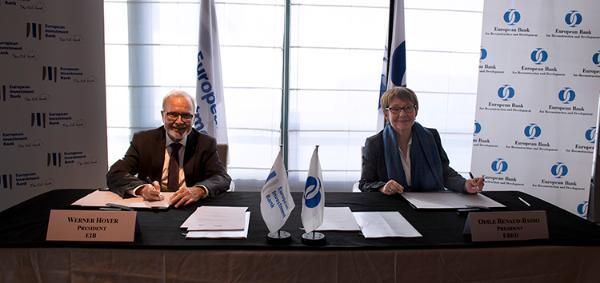
The European Investment Bank (EIB) and the European Bank for Reconstruction and Development (EBRD) have agreed to deepen their cooperation, aiming to improve the effectiveness of their delivery in countries outside the European Union where they both operate.
EIB President Werner Hoyer and EBRD President Odile Renaud-Basso signed a Framework Project Cooperation Agreement in London today with the goal of maximising their joint impact.
The agreement provides a framework for enhanced cooperation on joint financing projects and platforms outside the European Union, which can be implemented effectively and also scaled up over time.
The framework takes account of each institution’s mandate, policies and procedures and aims to cover all types of debt financing structures in the private or public sector, with joint projects and further areas of cooperation to be selected according to their complementarity and potential for joint impact.
The agreement will enable better coordination throughout the project cycle to achieve efficiencies and foster a harmonised approach to joint projects. The approach aims to optimise resources through: (i) greater coordination throughout the joint project cycle; (ii) allocation of roles and division of tasks to avoid duplication of work; and (iii) enhanced information sharing. It further provides the flexibility to customise cooperation on selected joint projects to the needs and specificities of such projects.
EIB President Werner Hoyer said: “As the EU bank, the EIB is taking steps to enhance Europe’s global impact as we tackle the urgent challenges that face us all: climate change, connectivity, jobs and prosperity, building resilience, and supporting a sustainable post pandemic recovery. Our shareholders, the EU member states, have asked us to develop a more effective partnership with the EBRD, and the agreement we have signed today will equip our institutions even better to work together in a complementary way.”
EBRD President Odile Renaud-Basso added: “This is a major step towards intensifying the cooperation between the EBRD and the EU. We have taken the Conclusion of the European Council from June on the future of the European Financial Architecture for Development very seriously and with our agreement today are making a concrete step towards to enhance our impact and effectiveness. We believe that this is an important first step with many more to follow.”
The EBRD started operations in 1991 to support the transition of state-controlled economies to private sector-based market economies after the fall of communism in Europe. Today the EBRD operates in 38 economies in Europe, Asia and Africa and has 72 shareholders from all over the world. The Bank’s focus today is on supporting the green transition by crowding in the private sector. As a global institution with a European core the EBRD is actively supporting Team Europe with its investments and engagements.
The EIB, which is owned by the EU’s 27 member states, has financed investment benefiting both the public and private sector outside the European Union for more than 50 years. The EIB is active in 160 countries, including enlargement and European Free Trade Association (EFTA) countries, Eastern and Mediterranean neighbours, African, Caribbean and Pacific (ACP) countries, Overseas Countries and Territories (OCT) and South Africa, as well as countries in Asia, Central Asia and Latin America. The 27 EIB offices located in Africa, Latin America and Asia help the Bank to deliver on its mission outside Europe.
The EBRD is a multilateral bank that promotes the development of the private sector and entrepreneurial initiative in 37 economies across three continents. The Bank is owned by 69 countries as well as the EU and the EIB. EBRD investments are aimed at making the economies in its regions competitive, inclusive, well-governed, green, resilient and integrated.